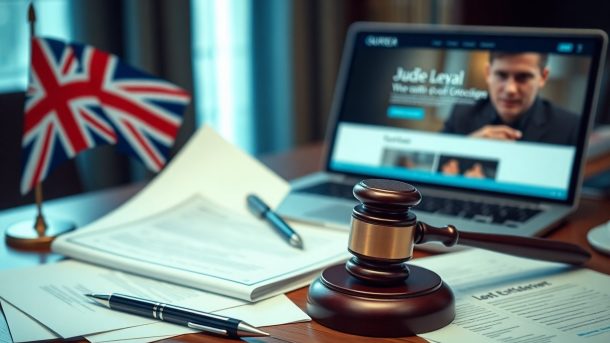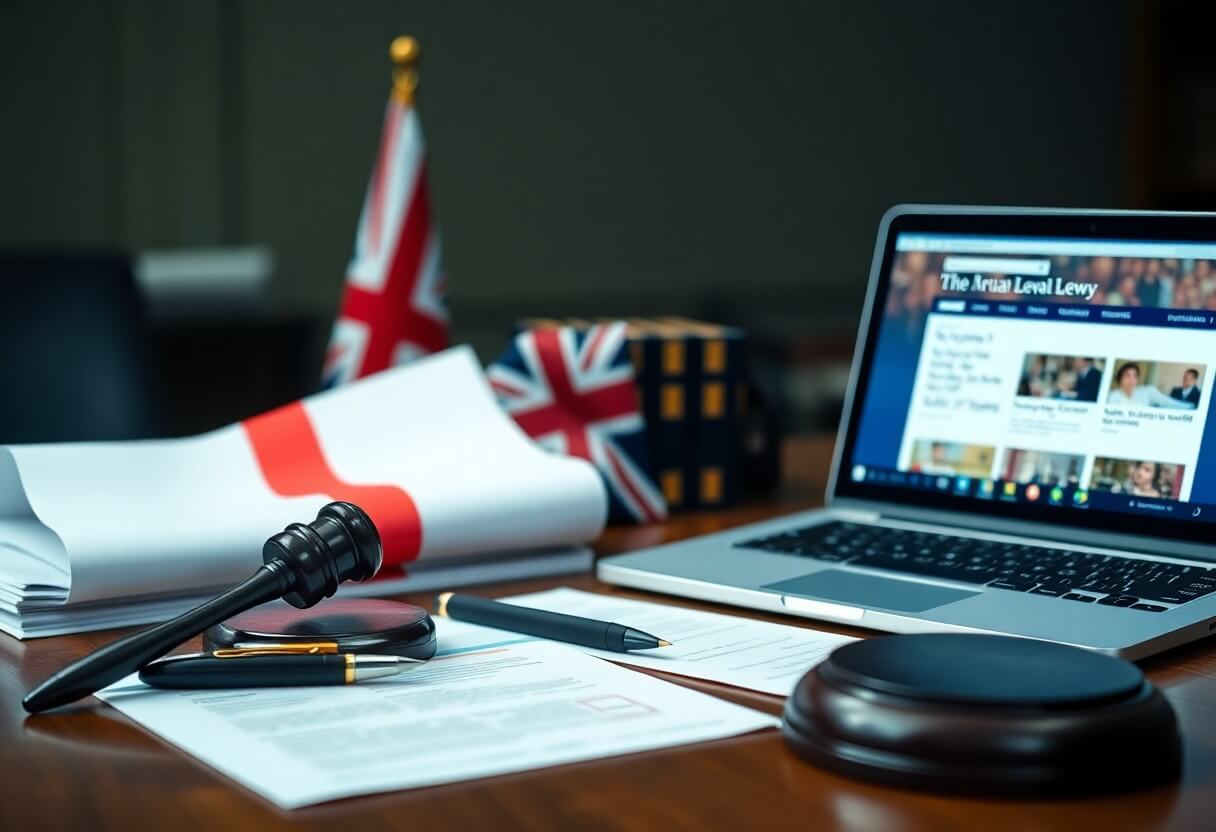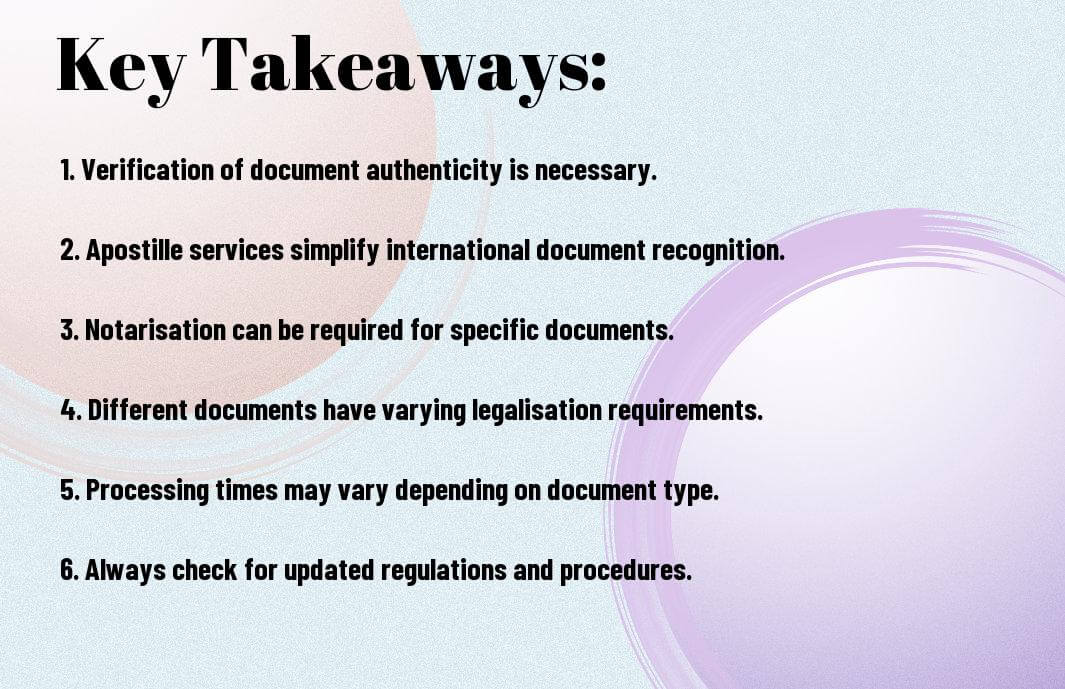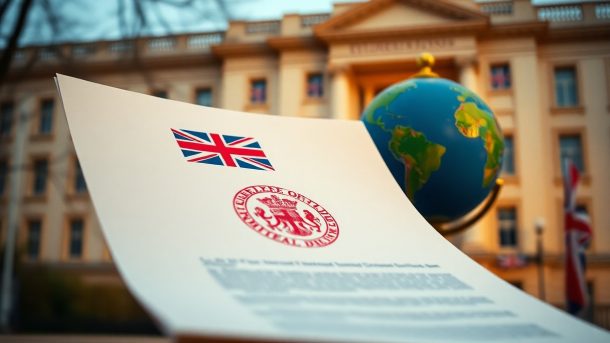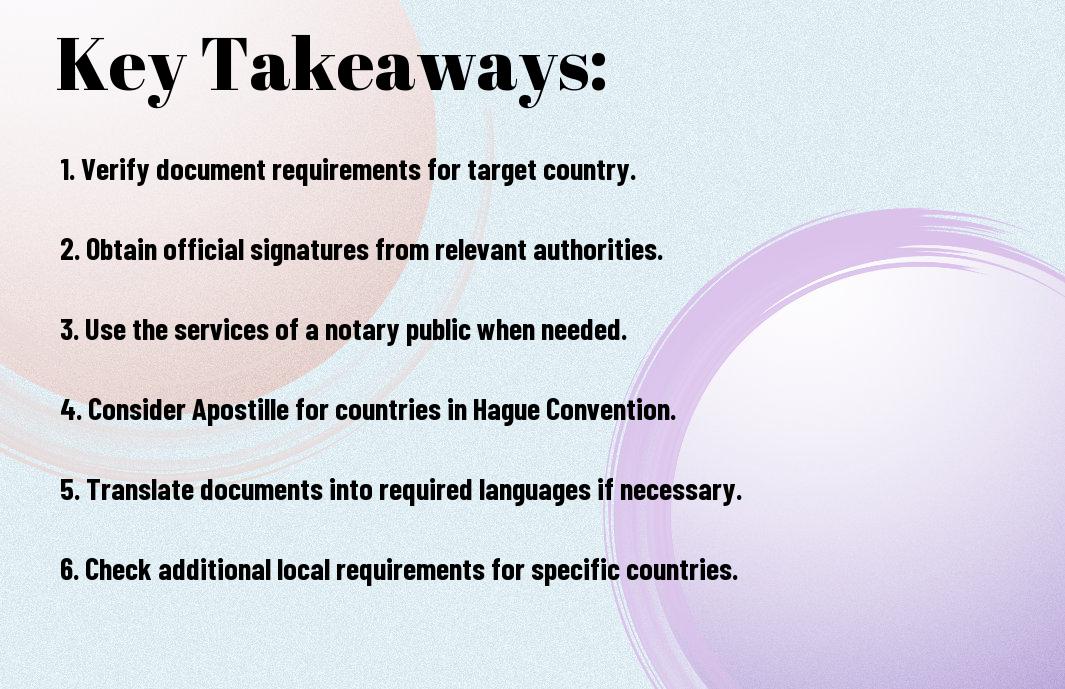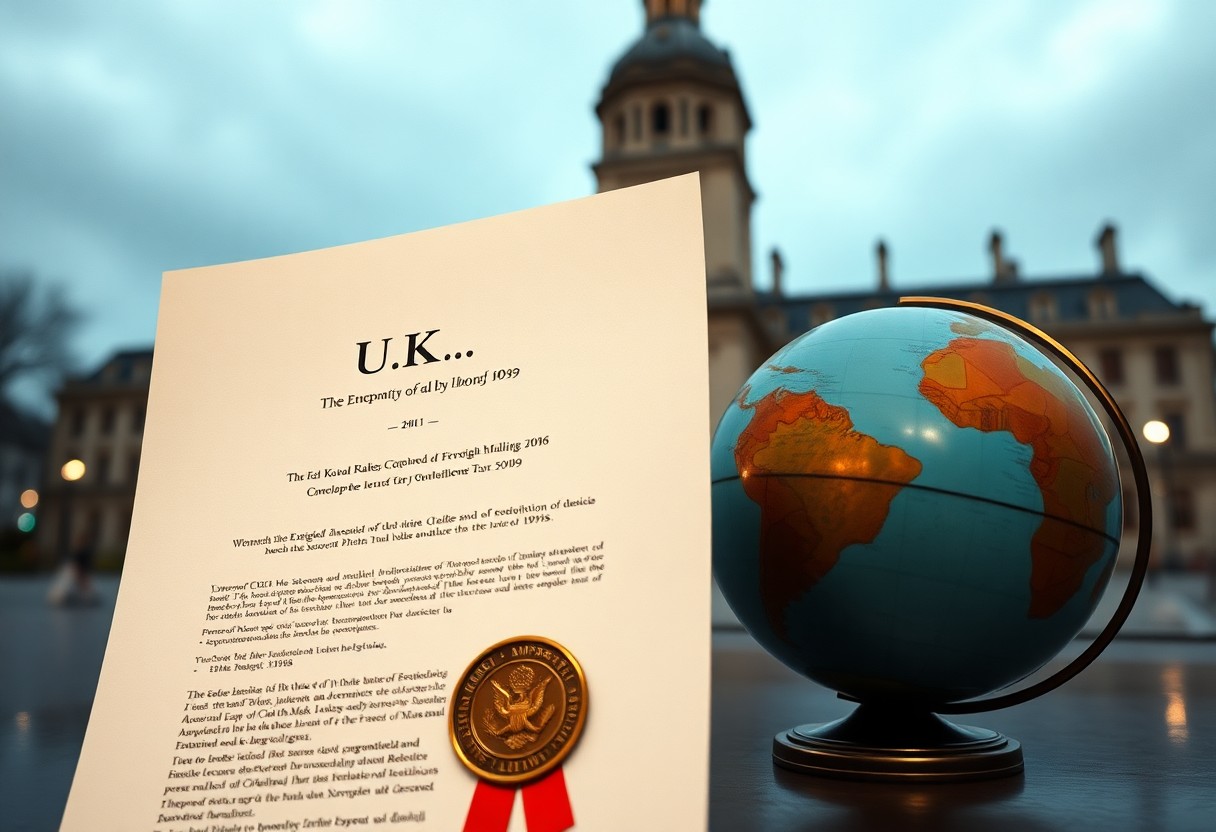You may find yourself needing to notarise certain documents to ensure their authenticity and legal standing in the UK. Understanding which documents typically require notarisation can save you time and streamline your processes. Commonly notarised items include powers of attorney, wills, and contracts. If you’re unsure about the notarisation process, you can learn more about How to get a document notarized in the UK to assist you in navigating this important legal step.
Key Takeaways:
- Legal Agreements: Documents such as contracts, leases, and business agreements often require notarisation to verify the identities of the parties involved.
- Wills and Trusts: Notarisation can enhance the authenticity of wills and trusts, ensuring they are legally binding and recognised by courts.
- Powers of Attorney: Creating a power of attorney document necessitates notarisation to confirm that the principal’s signature is valid and willingly executed.
- Affidavits: Sworn statements made under oath typically must be notarised to verify the affiant’s identity and the truthfulness of the content.
- Property Transactions: Documents related to property transactions, like deeds and mortgages, require notarisation to facilitate legal transfers and ensure compliance with regulations.
Importance of Notarisation in the UK
Before you engage in legal or financial transactions, understanding the importance of notarisation in the UK is imperative. Notarisation provides an official verification of your documents, ensuring their authenticity and preventing fraud. This process lends credibility to contracts, wills, and other important paperwork, protecting your interests and providing peace of mind. Additionally, many institutions, both domestic and international, require notarised documents, making it a necessary step in your legal affairs. By ensuring your documents are notarised, you affirm that your transactions are valid and legally binding.
Types of Documents Commonly Requiring Notarisation
Some documents often require notarisation to ensure their authenticity and legal standing. Examples include:
| Property Deeds | Affidavits |
| Wills | Powers of Attorney |
| Contracts | Business Agreements |
| Custody Agreements | Loan Documents |
| International Documents | Diplomatic Papers |
This ensures that your documents are legally binding and recognised by various institutions.
Property Transactions
With property transactions, notarisation plays an vital role in facilitating smooth transfers and protecting your interests. Documents such as property deeds, mortgage agreements, and lease contracts often require notarisation to verify identities and confirm consent.
Wills and Testaments
By having your will notarised, you establish its authenticity and reduce the risk of disputes among heirs. Notarisation serves as a safeguard, confirming that you were of sound mind when drafting the document, ensuring your final wishes are respected.
Documents such as wills must clearly articulate your wishes regarding asset distribution upon your passing. Notarisation helps to validate the intent behind your decisions, ensuring that your estate is handled according to your specifications. This step can prevent potential conflicts or challenges from arising, making it an important process for anyone planning their estate.
Powers of Attorney
Transactions requiring powers of attorney necessitate notarisation to safeguard against misuse and validate the authority granted. This can include decisions about financial management or medical care when you become unable to make those choices yourself.
Powers of attorney documents allow someone you trust to act on your behalf in various matters. Notarisation assures that the document is legitimate and that the person designated has legal authority to make decisions in your stead, promoting confidence in the arrangement.
Affidavits
Above all, affidavits are sworn statements that require notarisation to ensure their credibility and reliability in legal matters. You may find that various situations, such as court proceedings or loan applications, call for these documents.
Also, affidavits play a vital role in legal processes, serving as evidence or support for your claims. By notarising your affidavit, you confirm the truthfulness of your declarations, creating a more robust case in legal situations. This added layer of authenticity can significantly impact the outcomes of disputes or negotiations.
Notarisation Process in the UK
All documents requiring notarisation must go through a specific process in the UK. You will need to prepare your documents adequately before you initiate the notarisation. For an in-depth overview, check out the Ultimate Guide – Preparing Documents for a UK Notary Public. The notary public will verify your identity and witness your signature, ensuring the legal integrity of the document.
Role of Notary Public
Below are the necessary responsibilities of a notary public in the UK. You can expect them to authenticate documents, verify identities, and administer oaths. Their role is to act as an impartial witness to deter fraud, thus providing you with peace of mind about the documents being handled.
Required Documentation
Role of the notary public involves checking specific documentation from you. Typically, you are required to provide a valid form of identification, such as a passport or driver’s license, along with the relevant documents that need notarisation. This ensures that the notary can adequately verify your identity and the authenticity of the documents.
Due to the increasing number of fraudulent activities, the notary public must ensure that all presented documents are genuine. You should prepare any necessary paperwork before your appointment, as missing documents may delay the process. Additionally, you may need to offer proof of your address, depending on the type of notarisation required. Being well-prepared will make the notarisation process smoother for you.
Notarisation for International Use
Now that you understand the general purposes of notarisation, it’s important to know that certain documents may require additional steps when intended for international use. When you plan to use documents abroad, ensuring they are notarised correctly can help facilitate their acceptance in foreign jurisdictions. This process often involves further validation to meet the specific legal standards of the country where you intend to present the document.
Apostille Certification
Before submitting your notarised document for international purposes, check if it needs an Apostille certification. This form of authentication is designed for use under the Hague Convention, ensuring that your notarised documents are recognized by other countries without the need for further legalisation.
Legalisation Procedures
Along with Apostille certification, some countries require a more comprehensive legalisation process, which typically involves verification by the Foreign, Commonwealth & Development Office (FCDO) and possibly the embassy of the destination country. This procedure ensures that your documents meet local requirements.
Considering the various international requirements, it can be helpful to check the specific regulations of the country where you intend to use your documents. Many nations have distinct rules regarding legalisation, and fulfilling these requirements can help prevent delays or issues. It’s advisable to consult with a professional for guidance on the correct course of action, ensuring your documents are in compliance for seamless acceptance abroad.
Costs and Fees Associated with Notarisation
Once again, understanding the costs involved with notarisation is vital for you. The fees can vary based on several factors, including the type of document and the notary’s location. Typically, you can expect a set fee for standard notarisation tasks, though additional fees may apply for more complex services. Being aware of these costs upfront helps you budget accordingly for your notarial needs.
Standard Fees
Before engaging a notary, it’s wise to inquire about their standard fees for various services. Generally, notaries in the UK charge a baseline fee per signature or per document. These fees are often competitive, so it can be beneficial to shop around to find the best option that meets your requirements.
Additional Costs
Against this backdrop, you must consider additional costs that may arise during the notarisation process. These may include charges for urgent requests, travel fees, or any legal advice required to prepare your documents. It’s advisable to clarify these potential expenses with your notary in advance to avoid any surprises.
And further, additional costs can sometimes stem from specific requirements of certain documents, like authentication or apostille services. If your document needs to be sent internationally, you might encounter postage fees as well. Understanding these possible extra charges will ensure you’re fully prepared and that there are no unexpected financial hurdles while navigating the notarisation process.
Frequently Asked Questions About Notarisation
Not all documents require notarisation, but many legal and financial documents do. This includes wills, property deeds, and powers of attorney. Understanding the necessity of notarisation helps ensure that your documents are valid and can be enforced if needed.
Who Can Request Notarisation?
By law, any individual or organisation can request notarisation for documents. Typically, it’s you, as the signer of the document, who will seek out a notary public to verify your identity and witness your signature. This can also be initiated by a legal representative or business entity on your behalf.
What Happens If a Document is Not Notarised?
Notarisation may affect the legal acceptance of your document. If not notarised, a document might not be recognised by courts or institutions, leading to complications in transactions or legal matters.
Document notarisation serves as a safeguard against fraud and ensures that all parties involved assert their identity and consent. If you fail to notarise a required document, it may lack the official recognition needed for it to be enforceable. This could lead to delays, increased scrutiny, or outright rejection from relevant parties, impacting your ability to carry out your intended actions.
To wrap up
Drawing together the key points, understanding the common documents that require notarisation in the UK is imperative for ensuring the validity of your legal agreements. These documents often include wills, powers of attorney, property deeds, and international contracts. By familiarising yourself with these necessities, you can efficiently navigate the notarisation process and ensure that your important paperwork is legally recognised and enforceable. This knowledge will empower you to protect your interests and streamline your transactions when engaging in legal matters.
FAQ
Q: What types of documents commonly require notarisation in the UK?
A: In the UK, there are several types of documents that typically require notarisation. These include legal documents such as powers of attorney, property deeds, and wills. Additionally, contracts that require validation for international use often need a notary’s signature. Other examples include affidavits, agreements related to international business transactions, and documentation for adoption processes. Notarisation ensures that these documents are legally binding and acknowledged, especially when transacting across borders.
Q: Why is notarisation important for international documents?
A: Notarisation serves a vital function for international documents as it provides a level of authentication that is recognised by authorities in other countries. This can help prevent fraud and verify the identity of the signatories involved. As different jurisdictions have varied legal requirements, notarised documents may be required for activities such as property sales, legal proceedings, and immigration applications. Thus, having a document notarised can facilitate smoother transactions and enhance the document’s credibility across borders.
Q: How can one find a notary public in the UK?
A: To find a notary public in the UK, individuals can start by searching online directories such as the UK Notaries Society or the Notaries Public website. These platforms provide lists of licensed notaries available in specific regions. Additionally, law firms and local solicitors may also offer notary services or be able to recommend a qualified notary public. It’s imperative to choose a notary who is experienced with the specific type of document you need notarised, especially if it pertains to international use.



